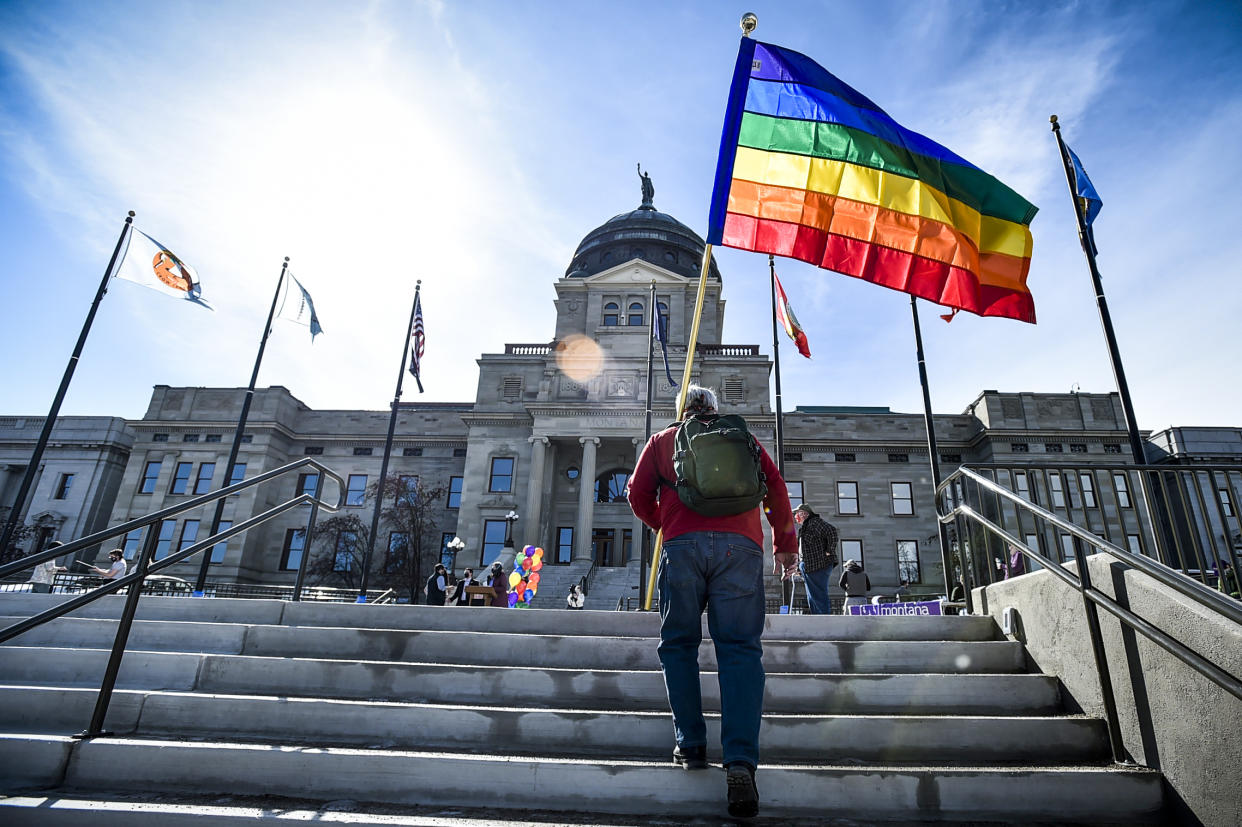Montana city allegedly withholds Pride parade permits over anti-drag law, lawsuit says
The organizers of Montana’s largest LGBTQ Pride parade joined a lawsuit Monday challenging a state law aimed at restricting drag performances.
A group of Montanans, including a transgender woman and the owners of an independent bookstore, filed suit on July 7 against city and state officials to block the law, which was the first in the country to ban people dressed in drag from reading books to children at schools and libraries or other publicly funded spaces.
The law also prohibits minors from attending “sexually oriented or obscene performances on public property” and prohibits such performances “on public property where children are present.”
The lawsuit argues that the law violates the First Amendment’s free speech protection and the 14th Amendment’s equal protection clause.
This year’s 30th annual Montana Pride, which sees about 15,000 attendees every year, is scheduled for July 30 to Aug. 6. However, the event’s organizers allege in a legal complaint that the city of Helena is refusing to issue permits for the same events the group hosts every year because of the drag restriction, the Montana Free Press first reported.
“In denying event permits to Montana Pride, Defendant City of Helena intended to suppress and in fact is suppressing Montana Pride’s protected speech, denying it the opportunity to host constitutionally protected events, and denying the audience the opportunity to attend these events,” states Monday’s amended complaint, with Montana Pride joining as a plaintiff and the City of Helena as a defendant.
Jacob Garcin, the public information officer for Helena, said in an email that the city has not officially denied permits for the Pride event. He said city staff met with the Pride organizers last week to discuss “all aspects of the application,” including how the drag restriction would affect the event.
“City staff communicated generally that the event will be permitted, with the expectation that it follows the law at the time of the event,” Garcin said. “Which is the same expectation of any other event. The application is still in the review process.”
Constance Van Kley, an attorney representing the plaintiffs, said it’s true the city hasn’t officially denied the permits. However, Kevin Hamm, the founder of the Happiness & Joy Foundation, a Helena-based nonprofit that organizes Montana Pride, said city officials told him during the meeting described by Garcin that the city would not issue the requested permits while the drag restriction remained in effect and enforceable.
“Ultimately, Montana Pride has an absolute right to organize and to participate in celebrating the community, as it has done for decades,” Van Kley said.
At least 16 states so far this year have considered similar restrictions on drag performances, and governors in four states — Arkansas, Florida, Montana and Tennessee — have signed them, though the final version of Arkansas’ bill struck drag performances from its list of adult-oriented businesses. Last month, federal judges declared Tennessee’s restriction unconstitutional and temporarily blocked Florida’s.

Montana’s law is the first to specifically target Drag Story Hour events, which it defines as “an event hosted by a drag queen or drag king who reads children’s books and engages in other learning activities with minor children present.” It also defines drag king and drag queen as a male or female performer who adopts a “flamboyant or parodic” male or feminine persona “with glamorous or exaggerated costumes and makeup.”
Gov. Greg Gianforte, a Republican, signed the bill in May because he “believes it’s wildly inappropriate for little kids, especially preschoolers and kids in elementary school, to be exposed to sexualized content,” spokesperson Kaitlin Price said in a statement to The Associated Press at the time.
Though pride organizers in Naples, Florida, pre-emptively moved drag performances indoors before Gov. Ron DeSantis even signed the state’s restriction into law, Van Kley said this is the first time that one of the laws “has been used to threaten an entire pride celebration.”
“It’s a sign of what’s to come,” Van Kley said. “In Montana, the law has been on the books now for a little bit of time, and people are starting to realize just how broad it is and what it says, and I think it’s just going to continue to spiral.”
